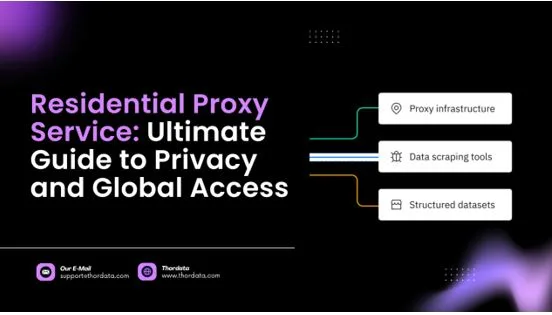Residential Proxy Service: Ultimate Guide to Privacy and Global Access
What Is a Residential Proxy Service?
A residential proxy is an intermediary that routes your internet traffic through a real device connected to a genuine internet service provider (ISP). In simple terms, instead of your requests coming directly from your IP address, they appear to come from a residential user somewhere else in the world.
How Residential Proxies Work
To understand how they function, think of residential proxies as middlemen who mask your real identity online. Here’s the process simplified:
- You send a request — like opening a website or scraping data.
- The proxy routes your request through a real residential IP address.
- The target website sees the residential IP, not yours.
- The response is delivered back to you—safe, clean, and undetected.
Because these IPs belong to real homes, not data centers, websites rarely flag or block them. This makes residential proxies one of the most reliable ways to browse or collect data at scale.
Why Residential Proxies Matter Today
Let’s face it: the modern internet is full of ‘gatekeepers’. From CAPTCHA walls to region-locked content, barriers stand between you and the data you need. Residential proxies are the master keys to these digital doors.
They allow us to:
- Bypass geo-restrictions on websites and platforms
- Avoid IP bans during web scraping or automation
- Ensure anonymity while managing social media or ad campaigns
- Access localized search results for accurate SEO research
- Collect competitive data without revealing your identity (important)
In short, they empower you to move freely through the internet—no questions asked.
Residential vs. Data Center Proxies
Before you choose a proxy, its crucial to understand the distinction between residential proxies and data center proxies.
| Feature | Residential Proxy | Data Center Proxy |
| Source | Real ISP-assigned IPs | Server-generated IPs |
| Anonymity | Very high | Moderate |
| Speed | Slightly slower | Extremely fast |
| Detection Risk | Very low | Higher |
| Best Use Case | Scraping, SEO, e-commerce | General browsing, testing |
While data center proxies are faster and cheaper, residential proxies win when it comes to authenticity and undetectability. Websites treat them as genuine users, not bots.
Top Benefits of Using Residential Proxy Services
So why are businesses—and individuals—flocking to residential proxies? Here are some standout advantages:
1. Enhanced Anonymity
Your real IP remains hidden, keeping your identity and location private. Perfect for tasks where discretion is key.
2. Access to Global Content
Want to see how your ad appears in Paris or Tokyo? Residential proxies let you view content as if you were there.
3. Reliable Data Collection
Web scraping and automation often trigger bans. Residential IPs make your activities look organic, minimizing interruptions.
4. Safe Multi-Account Management
From sneaker bots to social media marketing, managing multiple accounts can raise red flags. With unique residential IPs, you stay in the safe zone.
5. Real User Simulation
Websites trust residential IPs because they originate from real devices. This makes your activity appear completely legitimate.
Common Use Cases of Residential Proxy Services
Residential proxies are versatile tools—almost like digital Swiss Army knives. Here’s how they’re used across industries:
- E-commerce Monitoring: Track prices, analyze competitors, and verify product listings globally.
- SEO Research: Gather localized keyword data and monitor search engine rankings
- Ad Verification: Detect fraudulent ads and verify campaign placement across different regions.
- Social Media Management: Run multiple accounts, schedule posts, and analyze engagement without bans.
- Web Scraping: Collect vast amounts of public data without triggering anti-bot systems.
In short, wherever there’s data, there’s a reason to use residential proxies.
How to Choose the Right Residential Proxy Provider
Not all proxy providers are built the same. Choosing the right one determines how smoothly your operations run.When evaluating providers, look for:
- Large IP pool: The more IPs available, the less likely you’ll face bans.
- Rotating IPs: Automatically switches IPs for uninterrupted scraping.
- Global coverage: Access to diverse locations for region-based tasks.
- Speed and reliability: A good balance between performance and anonymity.
- Transparent pricing: Avoid hidden fees or unrealistic promises.
- Customer support: 24/7 availability is essential for mission-critical tasks.
- Pro tip: Always apply for a free trial before deciding on a long-term plan.
At Thordata, we understand these needs deeply. Our residential proxy network is designed to combine massive global coverage, high uptime, and ethical sourcing—all within a user-friendly dashboard that simplifies proxy management. Whether you’re handling large-scale data collection, market research, or AI model training, Thordata’s proxies ensure every connection feels as authentic as a real user’s.
We also offer turnkey integrations with major scraping frameworks and automation tools, allowing you to plug in your proxies instantly and scale operations without technical hassle.In short, Thordata is more than just a service provider; it’s your strategic partner in the modern data landscape.
Potential Challenges and How to Overcome Them
While residential proxies offer immense benefits, they’re not without challenges. The key is to manage them smartly.
| Challenge | How to Overcome |
| Slower Speed | Use a provider with optimized routing technology |
| Higher Cost | Choose pay-per-usage plans or shared pools |
| Ethical Concerns | Opt for providers with transparent and legal sourcing |
| Configuration Complexity | Use built-in dashboards or integration APIs |
Remember, success isn’t just about buying proxies—it’s about using them intelligently.
Best Practices for Using Residential Proxies Effectively
To get the best out of your proxies, follow these golden rules:
- Rotate IPs regularly to mimic natural behavior.
- Avoid sending too many requests from one IP.
- Respect target websites’ terms of service.
- Combine proxies with automation tools carefully.
- Monitor proxy performance to ensure uptime and stability.
Residential Proxy Security and Ethics
One of the biggest myths is that proxies are inherently shady. In truth, ethical use defines their value.
Legitimate businesses use residential proxies for competitive research, cybersecurity, and market insights—not for malicious purposes. Always ensure your provider sources IPs with user consent and complies with data privacy laws like GDPR and CCPA.
Transparency equals trust.
Conclusion
Residential proxy services are more than tools—they’re digital enablers that make secure, unrestricted access possible. From e-commerce to AI model training, they’re reshaping how we gather, protect, and interpret data.
If privacy, reliability, and global reach matter to you, residential proxies aren’t just an option—they’re a necessity.
Frequently Asked Questions (FAQ)
- Are residential proxies legal?
Yes. When used ethically and sourced responsibly, residential proxies are 100% legal. - Can residential proxies be detected?
They are the hardest to detect since they use real residential IPs from genuine ISPs. - What’s the difference between static and rotating residential proxies?
Static proxies keep one IP address, while rotating ones switch periodically to prevent bans. - How many proxies do I need for web scraping?
It depends on your scraping scale. Generally, more IPs equal safer and faster scraping. - Do residential proxies affect internet speed?
Slightly, yes. However, premium providers optimize routes to keep performance high. - Can I use them for streaming or gaming?
Yes, they help bypass geo-restrictions, but always choose low-latency options for streaming or gaming.





